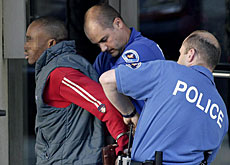Police watchdog gets more bite in Geneva

Human rights groups have welcomed plans by canton Geneva to set up Switzerland's first independent police ethics commission, saying the idea should be extended nationwide.
The three-strong body will examine all cases involving restraint by police and prison officers in the canton and decide whether appropriate force has been used.
Geneva has had a single police watchdog for around a decade, but last year the canton’s parliament voted to establish a fully fledged ethics commission to cover both police and prisons, and to compile an annual report. The commission is expected to start work shortly.
Police in Geneva, along with forces throughout French-speaking Switzerland, have historically suffered from a poor reputation among some sections of the public. But the Swiss section of Amnesty International believes the appointment of the commission should go some way towards redressing the balance.
“Geneva police want to work on the question of human rights violations and I think there is the political will from the authorities and also the police commander. A lot of measures have already been taken in the field of training and I’m sure we will have an improved situation in Geneva,” spokeswoman Denise Graf told swissinfo.
“Amnesty and other organisations have asked cantons to introduce independent appeal commissions to deal with all complaints against police. I think this is a first step in that direction.”
Amnesty says Geneva’s police watchdog has already been successful in persuading the police to review intervention methods. One particular bone of contention has been the use of chokeholds to restrain suspected drug dealers and force them to spit out wraps of cocaine. Officers now receive training in how this can be carried out safely.
Heavy workload
Former magistrate Louis Gaillard, who took over the post of police ethics commissioner in January last year, is looking forward to sharing the burden.
Since taking office, he has examined 1,600 restraint cases involving handcuffs, chokeholds, police dogs and firearms. Eighty of these resulted in criminal proceedings, and Gaillard ruled on whether the use of force had been appropriate in a quarter of these cases.
He is convinced the new body will carry “weight and authority” and that the police will listen to any recommendations, “as they have done in the past”.
“I am not out there on the ground so I have no way of controlling whether the information is passed down through the ranks,” he told swissinfo. “But all the same I think my recommendations carry a certain amount of weight. This is not simply a public relations exercise,” he said.
Police support
According to Gaillard, interest in the Geneva model varies across the country. But he claims that police forces are generally in favour of ethics commissions as they offer protection for officers.
“Because they are independent, police commanders find it useful to see what types of action are approved by ethics commissions,” said Gaillard, who practises commercial law in Geneva.
He also recognised that there had been a move in recent years among the police towards greater transparency and awareness of human rights.
“Today there is a dialogue between groups like Amnesty and SOS Racism and the authorities – and this is a good thing. We speak to each other more and more, and deal with problems together. The police have a thankless task and it’s good there are contacts so that all sides can give their opinion.”
Bernard Duport, a senior cantonal official, said he expected the two new commission members to be appointed shortly and for the body to start work within a matter of weeks.
Duport added that he was certain the creation of the commission would go some way towards improving the image of police in Geneva.
“It is in the police’s interest to have such an institution, and it is something that can help them in certain cases,” he said. “Criticism aimed at officers deserves to be examined in an objective way, especially by people who understand the problems faced by police in their daily work.”
swissinfo, Adam Beaumont in Geneva
According to Geneva police statistics for 2005:
Police used restraint techniques on 1,090 occasions – down more than 11% on the previous year.
A doctor was required to be present 344 times. Officers were injured on 163 occasions.
Restraint was mostly used during drug busts and when officers came under attack.
28 complaints were lodged against the police for excessive use of force – down almost 25% on 2004.

In compliance with the JTI standards
More: SWI swissinfo.ch certified by the Journalism Trust Initiative

You can find an overview of ongoing debates with our journalists here. Please join us!
If you want to start a conversation about a topic raised in this article or want to report factual errors, email us at english@swissinfo.ch.